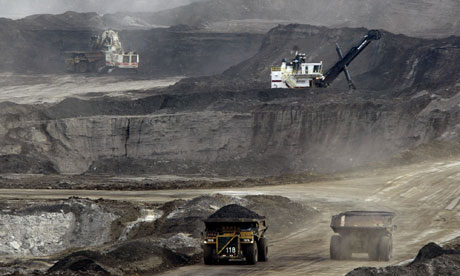The Canadian government's promotion of the tar sands industry is setting the world on a course of catastrophic climate change, a group of climate scientists and economists have warned.
In a letter made available to the Guardian, the academics urged Canada's natural resources minister, Joe Oliver, to consider the consequences of his support for expanding Alberta's tar sands production.
Oliver has in recent months emerged as the main proponent for the Keystone XL pipeline in Washington and other capitals. He is due in London this week.
The project would pump crude from the tar sands directly to refineries on the Texas Gulf coast, and so provide a much-needed outlet for Canada's crude.
But the academics warned that unlocking Alberta's tar sands, which are thought to hold some 170bn barrels of recoverable oil, would put a dangerous amount of carbon into the atmosphere.
Production from the tar sands causes higher greenhouse gas emissions than conventional crude oils.
The academics said that expanding the tar sands ran in the face of recommendations from the International Energy Agency and others that two-thirds of the world's fossil fuel reserves should not be commercialised – in order to avoid catastrophic climate change.
"The implication is clear: the responsibility for preventing dangerous climate change rests with today's policymakers," the letter said.
"We are not convinced that your advocacy in support of new pipelines and expanded fossil fuel production takes climate change into account in a meaningful way," the academics went on.
Oliver, along with other Canadian officials, has made repeated visits to Washington and other US cities in recent months in an effort to ensure the Obama administration signs off the Keystone XL pipeline project, which would provide an important outlet for crude from Alberta's tar sands.
The minister has also made a reputation for his combative approach to opponents of tar sands development.
He has publicly scolded the Nasa scientist, James Hansen, for his opposition to the Keystone XL pipeline, and dismissed Canadian critics of the tar sands as "radicals".
At the same time, however, Oliver has publicly claimed to be concerned about climate change. He told an audience in Washington last month that developing the tar sands and the Keystone XL pipeline would increase greenhouse gas emissions by only a negligible amount.
But the academics in their letter said the policies promoted by Oliver, and Canada's prime minister, Stephen Harper, did not appear aimed at limiting greenhouse gas emissions, and so avoiding the worst effects of climate change. "It is this very dangerous pathway – not the '450 scenario [parts per million of carbon dioxide in the atmosphere]' linked to avoiding 2C of global warming – that you seem to be advocating when promoting Canadian fossil fuel development at home and abroad," the scientists said.
Original Article
Source: guardian.co.uk
Author: Suzanne Goldenberg
In a letter made available to the Guardian, the academics urged Canada's natural resources minister, Joe Oliver, to consider the consequences of his support for expanding Alberta's tar sands production.
Oliver has in recent months emerged as the main proponent for the Keystone XL pipeline in Washington and other capitals. He is due in London this week.
The project would pump crude from the tar sands directly to refineries on the Texas Gulf coast, and so provide a much-needed outlet for Canada's crude.
But the academics warned that unlocking Alberta's tar sands, which are thought to hold some 170bn barrels of recoverable oil, would put a dangerous amount of carbon into the atmosphere.
Production from the tar sands causes higher greenhouse gas emissions than conventional crude oils.
The academics said that expanding the tar sands ran in the face of recommendations from the International Energy Agency and others that two-thirds of the world's fossil fuel reserves should not be commercialised – in order to avoid catastrophic climate change.
"The implication is clear: the responsibility for preventing dangerous climate change rests with today's policymakers," the letter said.
"We are not convinced that your advocacy in support of new pipelines and expanded fossil fuel production takes climate change into account in a meaningful way," the academics went on.
Oliver, along with other Canadian officials, has made repeated visits to Washington and other US cities in recent months in an effort to ensure the Obama administration signs off the Keystone XL pipeline project, which would provide an important outlet for crude from Alberta's tar sands.
The minister has also made a reputation for his combative approach to opponents of tar sands development.
He has publicly scolded the Nasa scientist, James Hansen, for his opposition to the Keystone XL pipeline, and dismissed Canadian critics of the tar sands as "radicals".
At the same time, however, Oliver has publicly claimed to be concerned about climate change. He told an audience in Washington last month that developing the tar sands and the Keystone XL pipeline would increase greenhouse gas emissions by only a negligible amount.
But the academics in their letter said the policies promoted by Oliver, and Canada's prime minister, Stephen Harper, did not appear aimed at limiting greenhouse gas emissions, and so avoiding the worst effects of climate change. "It is this very dangerous pathway – not the '450 scenario [parts per million of carbon dioxide in the atmosphere]' linked to avoiding 2C of global warming – that you seem to be advocating when promoting Canadian fossil fuel development at home and abroad," the scientists said.
Original Article
Source: guardian.co.uk
Author: Suzanne Goldenberg

No comments:
Post a Comment